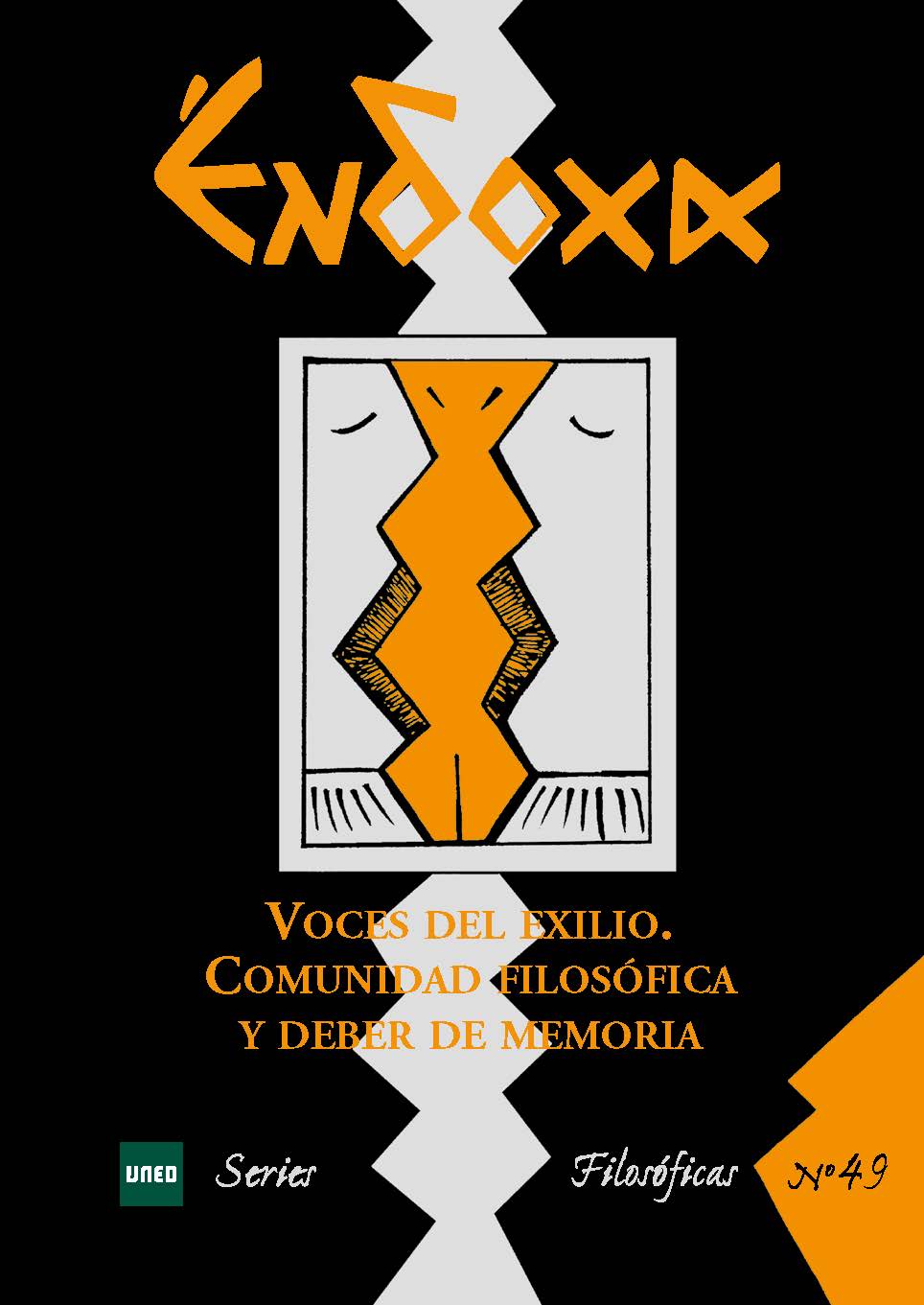Exile and Horror in the Works of María Zambrano and Adriana Cavarero
Autobiography, 'Gedankenexperiment', and Concept of Limit
DOI:
https://doi.org/10.5944/endoxa.49.2022.33326Keywords:
exile, state, Antigone, bio-politics, ethicsAbstract
Exile is an autobiographic experience, as well as a theme of philosophical
reflection in the works of María Zambrano. In this article I propose an interpretation of the figures of exile and the subject suffering exile that takes them as a Gedankenexperiment
– that is an hypothetic and imaginative reasoning turning around a concrete
example – that allows Zambrano to develop a philosophical argument within the frame of figurative language. The interpretation allows me to follow the circulation of the figures and the influence they had in the development of Italian bio-political philosophy, most prominently in the works of Adriana Cavarero. Further, I argue that the figures of the exile, and the subject suffering exile, are understood philosophically as a limit
interior to the state in the works of both authors, and that this idea carries with it ethical consequences. I conclude that the method of writing figuratively is a conscious choice
of style that aims at making the ethical stance found in the philosophical elaboration effective on the level of the text.
Downloads
References
Agamben, G. & Sofri, A. (1985). “Adriano Sofri intervista Giorgio Agamben”. En
Reporter, Noviembre 9-10, 32-33.
Andrés Castellanos, D. & Mora García J.L. (eds.) (2011). De ley y de corazón.
Historia epistolar de una amistad. Madrid: Caja Segovia, Universidad Autónoma de
Madrid.
Arendt, H. (1950). The Origins of Totalitarianism. New York: Harcourt.
Bataille, G. (1955). “Hegel, la mort et le sacrifice”. En Deucalion, vol. 5, 21-43.
Bergamín, J. & Dennis, N. (2004). Dolor y claridad de España, cartas a María Zambrano.
Sevilla: Editorial Renacimiento.
Bundgård, A. (2000). Más allá de la filosofía – sobre el pensamiento filosófico-místico de
María Zambrano. Madrid: Trotta.
Cavarero, A. (2002). Stately bodies, literature, philosophy and the question of gender. Ann
Arbor: University of Michigan Press.
— (2005). For more than one voice, towards a philosophy of vocal expression. Stanford:
Stanford University Press.
— (2011). Horrorism, naming contemporary violence. New York: Columbia University
Press.
— (2013). “Recritude: Reflections on Postural Ontology”. En Journal of Speculative
Philosophy, vol. 27:3, 220-235.
Enquist Källgren, K. (2017). “Exile as context. A broader perspective on the circulation
of knowledge”. En Lychnos 2017/1.
Enquist Källgren, K., Fenoy Gutiérrez, S. & Moreno Sanz, J. (2019). “Presentación,
la última tabla de un naufragio: el país de los vivientes”. En Zambrano, M.
Obras Completas, vol. IV:2, ed. Moreno Sanz, J. Barcelona: Galaxia Gutenberg,
-379.
Hegel, G.W. F. (1907). Phänomenologie des Geistes. Leipzig: Verlag der Dürr’schen
Buchhandlung.
Horowitz, T. & Massey, G.J. (1991). Thought experiments in science and philosophy.
Savage: Rowman & Littlefield.
Kaufmann, W. (1968). Nietzsche, Philosopher, Psychologist, Antichrist. New Jersey: Princeton
University Press.
Kelly, M. (1983). “The post-war Hegel revival in France: a bibliographical essay”. En
Journal of European Studies, vol. xiii, 199-216.
Maillard, C. (1992). La creación por la metáfora – introducción a la razón poética. Barcelona:
Anthropos.
Maillard, M. L. (1997). María Zambrano. La literatura como conocimiento y participación.
Lleida: Universitat de Lleida.
Morey, M. (2018). Vidas de Nietzsche. Madrid: Alianza.
Nietzsche, F. (1887). Morgenröthe. Gedanken über die moralischen Vorurtheile. Leipzig:
E.W. Fritzsch.
Revilla, C. (1998). Claves de la razón poética. Madrid: Trotta.
Secord, J. (2004). “Knowledge in Transit”. En Isis 95/4, 654-672.
Szabo Gendler, T. (2010). Intuition, imagination and philosophical methodology.
Oxford: Oxford University Press.
Trapanese, E. (2018). “Lecturas de Antígona o de la ciudad inclinada”. En Las Torres
de Lucca, vol. 7:12 (Dossier “El exilio como figura política”, editado por Antolín
Sánchez Cuervo), 103-124.
Zambrano, M. (1934). “Por qué se escribe”. En Revista de Occidente, XLIV.
— (2004a). “Letter to Rafael Dieste, November 7, 1944”. En La Razón en la sombra –
antología crítica, Moreno Sanz, J. (ed.). Madrid: Siruela, 114-125.
— (2009). Amo mi exilio. Las palabras del regreso, ed. Mercedes Gómez Blesa. Madrid:
Cátedra, 65-67.
— (2011a). La tumba de Antígona. Obras Completas, vol. III, ed. Moreno Sanz, Jesús.
Barcelona: Galaxia Gutenberg.
— (2011b). Persona y democracia. Obras completas, vol. III, ed. Moreno Sanz, Jesús.
Barcelona: Galaxia Gutenberg.
— (2011c). El hombre y lo divino. Obras completas, vol. III, ed. Moreno Sanz, Jesús.
Barcelona: Galaxia Gutenberg.
— (2018a). De la aurora. Obras completas, vol. IV:1, ed. Moreno Sanz, Jesús. Barcelona:
Galaxia Gutenberg.
— (2018b). Claros del Bosque. Obras completas, vol. IV:1, ed. Moreno Sanz, Jesús. Barcelona:
Galaxia Gutenberg.
— (2019a). Notas de un método. Obras completas, vol. IV:2, ed. Moreno Sanz, Jesús.
Barcelona: Galaxia Gutenberg.
— (2019b). Los Bienaventurados. Obras completas, vol. IV:2, ed. Moreno Sanz, Jesús.
Barcelona: Galaxia Gutenberg.
Downloads
Published
Versions
- 2022-06-27 (2)
- 2022-06-27 (1)
How to Cite
Issue
Section
License

This work is licensed under a Creative Commons Attribution-NonCommercial-NoDerivatives 4.0 International License.
The authors who publish in this journal must agree to the following terms:
- The authors hold author’s rights and guarantee the journal the right to be the first to publish the work as well as the Creative Commons Attribution License which allows others to share the work as long as they acknowledge the authorship of the work and its initial publication in this journal.
- The authors can establish, on their own, additional agreements for the non-exclusive distribution of the version of the work published in the journal (for example, placing it in an institutional repository or publishing it in a book), always acknowledging the initial publication in this journal.
- The authors are allowed and encouraged to disseminate their work electronically (for example, in institutional repositories or on their own webpages) before and during the submission process, as this can give rise to productive exchanges, as well as earlier and increased citing of the works published (See The Effect of Open Access).








